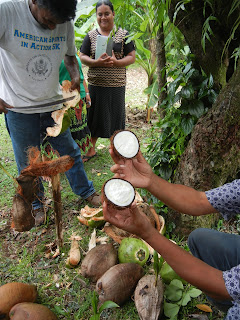One of the things I am most proud of is my ability to laugh
at myself even when things aren’t going so well.
Take this past Wednesday morning for example.
I woke up in a pretty bad mood. I had gotten little sleep
due to a bug bite on my palm that was exceptionally itchy and at times painful.
When I looked at my hand the next morning, I found the bug bite had caused my
hand to swell and become a worrisome red. Cool. The swelling would go down
eventually and for the meantime I’d just have to deal. I laughed and
congratulated myself on my first Peace Corps medical issue, and what a lame one
it was at that.
I then decided not to wash my hair or shave my armpits
because my hand was so uncomfortable (and honestly because I just wasn’t in the
mood) and I laughed that I was no longer the Rachel back home who could not
leave the house without her hair washed or her armpits shaved. It helps not
having mirrors around.
After my short body shower and dressing myself, I walked
into the living room and sat down to flies swarming my breakfast. I laughed a
few minutes later when I realized I didn’t even hesitate to eat the food. Sanitary,
I know.
Walking to school I got caught in the rain and slipped twice
on the wet ground. I did that awkward catch-myself-then-look-around-to-see-if-anyone-saw
movement and had to laugh when I realized people definitely saw me. I’m making
such a great impression here.
And when I was maybe 3 yards away from our training
classroom, I stepped into a giant puddle of mud. I was SO CLOSE to making it
all the way, free from dirt and mud! I laughed that I’ll know when I’m completely
assimilated when I can walk anywhere in sandals and keep my feet perfectly
clean, just like the locals do.
While any of those things could have ruined my day, I tried not
to take them too seriously. That may be because I subconsciously know this lifestyle
is only temporary. It may be because I’ve stopped caring. But I prefer to think
it’s because I’ve come to the realization that there are far worse things to
fret over than dirty feet. Then again, that could just be the optimistic PCT
side talking.
Whatever the reason may be, I’m glad I’m laughing and not
freaking out (for the most part).
Laughter and making light of situations is something that
I’m not only using as a coping mechanism, but that other PCTs are using as
well.
During our language session that same Wednesday afternoon,
one of my fellow PCTs told us about an awkward interaction she had had with her
host family the night before.
Hoping to practice her Mortlockese, she used the Mortlockese
word for “thank you”, killisou (key-lee-so),
when her host dad gave her some bottled water. The host dad became very quiet
and looked at her questioningly. She noticed the rest of her host family had
fallen silent and she wondered what she had done wrong. Apparently she had
mispronounced killisou and ended up
saying kilisou, which is a Pohnpeian
word for “naked.” Her host family is Pohnpeian, so they didn’t know she was
trying to say “thank you” in Mortlockese at first. Talk about awkward. She said
the whole family was still laughing and joking about the incident the next
morning at breakfast.
Rather than getting upset or frustrated with her
pronunciation mistake, she laughed about it and recounted the story to us so we
could all laugh with her. I think I speak for the rest of the PCTs when I say
laughter is a great coping mechanism.
As I’ve mentioned in previous blog entries, I have yet to
reach the most challenging parts of my service, but I hope I can keep laughing
at myself even when those times come.
Enjoy your clean feet,
Rachel
P.S. My hand continued swelling throughout Wednesday and
Thursday, causing me to contact the PCMO (Peace Corps Medical Officer). I took ibuprofen
and used a hot compress to help reduce the swelling, but it took a few days for
my hand to return to its normal color and size. Still not sure what caused it—I
don’t think a bug bite would continue spreading like that after the first day…
P.S.S. If you’ve stayed updated with me though Facebook, you
probably know that my permanent site will be on Ettal Atoll in the Mortlocks of
Chuuk, so I’m also learning Mortlockese along with the PCT I mentioned! There
are 6 of us going to the Mortlocks, 2 going to Chuuk Lagoon, 3 going to Yap
main island, 3 going to Kosrae, and 4 staying on Pohnpei. Since the languages
are different in every state, and sometimes even from island to island, we’ve
been separated into groups for our language classes. We move to our permanent
sites and in with our permanent host families mid August of this year.































